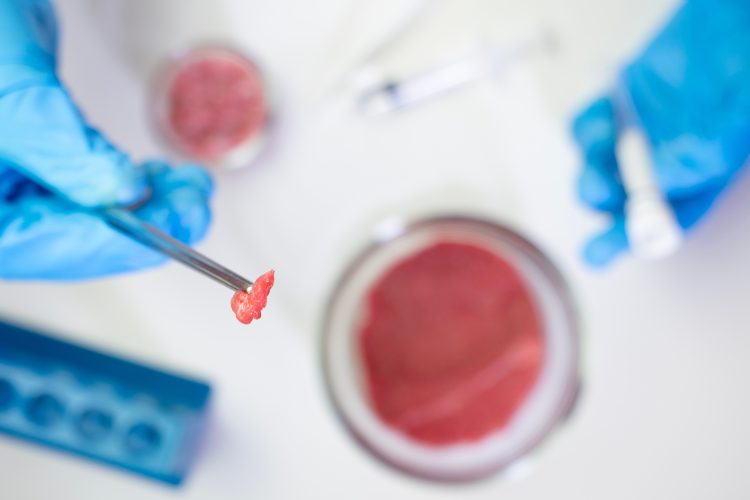Could this cut cultivated meat production costs?
- Like
- Digg
- Del
- Tumblr
- VKontakte
- Buffer
- Love This
- Odnoklassniki
- Meneame
- Blogger
- Amazon
- Yahoo Mail
- Gmail
- AOL
- Newsvine
- HackerNews
- Evernote
- MySpace
- Mail.ru
- Viadeo
- Line
- Comments
- Yummly
- SMS
- Viber
- Telegram
- Subscribe
- Skype
- Facebook Messenger
- Kakao
- LiveJournal
- Yammer
- Edgar
- Fintel
- Mix
- Instapaper
- Copy Link
Posted: 29 January 2024 | Grace Galler | No comments yet
Scientists at Tufts University have created bovine muscle cells, something they claim can remove “costly ingredients from the production process” of cultivated meat.


Researchers at Tufts University have now created bovine muscle cells, something they claim produces its own growth factors, and is “a step that can significantly cut costs of production” of cultivated meat.
Lead by David Kaplan, Stern Family Professor of Engineering, the research team at Tufts University Center for Cellular Agriculture (TUCCA) explain that their innovation allows for growth factors to bind to receptors on the cell surface and provide a signal for cells to grow and differentiate into mature cells of different types.
Published in the journal Cell Reports Sustainability, the scientists modified stem cells to produce their own fibroblast growth factor (FGF) which triggers growth of skeletal muscle cells – the kind that can be found in a steak or hamburger.
“FGF is not exactly a nutrient. It’s more like an instruction for the cells to behave in a certain way. What we did was engineer bovine muscle stem cells to produce these growth factors and turn on the signaling pathways themselves,” said Andrew Stout, then lead researcher on the project and Director of Science at Tufts Cellular Agriculture Commercialisation Lab.
According to the team, until now, growth factors had to be added to the surrounding liquid, or media. They are made from recombinant protein and can contribute to a majority of the cost of production for cultivated meat (up to or above 90 percent).
“Since the growth factors don’t last long in the cell culture media, they also have to be replenished every few days. This limits the ability to provide an affordable product to consumers. Taking that ingredient out of the growth media leads to an enormous cost savings,” said the researchers.
Now, Stout is leading several research projects at Tufts University Cellular Agriculture Commercialisation Lab —a technology incubator space that has been set up to take innovations at Tufts University and develop them to the point at which they can be applied at an industrial scale in a commercial setting.
Aleph Farms makes history as world’s first cutlivated beef is approved for sale
“While we significantly cut the cost of media, there is still some optimization that needs to be done to make it industry-ready. We did see slower growth with the engineered cells, but I think we can overcome that,” said Stout. Strategies that have been highlighted include the potential to changing the level and timing of expression of FGF in the cell or altering other cell growth pathways.
“In this strategy, we’re not adding foreign genes to the cell, just editing and expressing genes that are already there to see if they can improve growth of the muscle cells for meat production. That approach could also lead to simpler regulatory approval of the ultimate food product, since regulation is more stringent for addition of foreign genes vs editing of native genes,” continued Stout.
But will the strategy will also work when it comes to other types of meat such as pork, chicken and fish? Well according to Stout “all muscle cells and many other cell types typically rely on FGF to grow.”
Speaking on the implementation of strategies on other meats, the lead researcher has said that he envisions the approach “will be applied to other meats, although there may be variability for the best growth factors to express in different species”.
“Work is continuing at TUCCA and elsewhere to improve cultivated meat technology,” said Kaplan, “including exploring ways to reduce the cost of nutrients in the growth media, and improving the texture, taste, and nutritional content of the meat. Products have already been awarded regulatory approval for consumption in the U.S. and globally, although costs and availability remain limiting. I think advances like this will bring us much closer to seeing affordable cultivated meat in our local supermarkets within the next few years,” concluded Stout.
With Aleph Farms recently making history with the world’s first cultivated beef being approved for sale, and other cultured meat companies working on getting approval to allow their products to be brought to market, the sector is likely to be keeping an eye on how the use of created bovine muscle cells in the cultivated meat production process could adjust costs.








